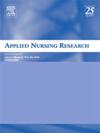Investigating the role of lifestyle, knowledge and health beliefs in performing preventive behaviours against human papilloma virus in married women
IF 2.2
4区 医学
Q1 NURSING
引用次数: 0
Abstract
Objectives
The aim of this research was investigating the role of lifestyle, knowledge and health beliefs in performing preventive behaviours against HPV in married women.
Background
Human Papilloma Virus (HPV) is a significant public health concern in Iran, with a relatively high prevalence in the general female population.
Methods
The study utilized a cross-sectional survey among 260 married women working at the university. The data collection instruments comprised knowledge, lifestyle, and health belief model (HBM) questionnaires. The data analysis was performed using SPSS.
Findings
The study's notable strength lies in its examination of the influential factors affecting HPV preventive behaviours through the HBM, utilizing a culturally relevant questionnaire tailored to Iranian circumstances. Notably, self-efficacy and perceived benefits merged as the strongest predictors of engaging in preventive behaviours against HPV, respectively.
Conclusion
Notably, self-efficacy and perceived benefits merged as the strongest predictors of engaging in preventive behaviours against HPV, respectively. Therefore, it is crucial for future interventions to focus on addressing these constructs to promote HPV vaccination and other preventive behaviours effectively. Besides, it is essential to recognize the close relationship between self-efficacy and perceived barriers. Understanding the key barriers to HPV vaccination and other preventive behaviours is crucial, as addressing these barriers can enhance individuals' self-efficacy and, in turn, promote the adoption of these preventive measures effectively.
调查已婚妇女的生活方式、知识和健康信念在采取预防人类乳头瘤病毒行为方面的作用。
目的:本研究的目的是调查生活方式、知识和健康信念在已婚妇女预防HPV行为中的作用。背景:人乳头瘤病毒(HPV)在伊朗是一个重要的公共卫生问题,在普通女性人群中患病率相对较高。方法:采用横断面调查的方法,对260名在校工作的已婚女性进行调查。数据收集工具包括知识、生活方式和健康信念模型(HBM)问卷。数据分析采用SPSS软件。研究结果:该研究的显著优势在于它通过HBM检查了影响HPV预防行为的影响因素,使用了针对伊朗情况量身定制的文化相关问卷。值得注意的是,自我效能感和感知收益分别成为参与HPV预防行为的最强预测因子。结论:值得注意的是,自我效能感和感知收益分别是参与HPV预防行为的最强预测因子。因此,至关重要的是,未来的干预措施将重点放在解决这些结构,以促进HPV疫苗接种和其他有效的预防行为。此外,必须认识到自我效能感与感知障碍之间的密切关系。了解HPV疫苗接种和其他预防行为的主要障碍至关重要,因为解决这些障碍可以提高个人的自我效能感,进而促进有效地采取这些预防措施。
本文章由计算机程序翻译,如有差异,请以英文原文为准。
求助全文
约1分钟内获得全文
求助全文
来源期刊

Applied Nursing Research
医学-护理
CiteScore
4.50
自引率
0.00%
发文量
65
审稿时长
70 days
期刊介绍:
Applied Nursing Research presents original, peer-reviewed research findings clearly and directly for clinical applications in all nursing specialties. Regular features include "Ask the Experts," research briefs, clinical methods, book reviews, news and announcements, and an editorial section. Applied Nursing Research covers such areas as pain management, patient education, discharge planning, nursing diagnosis, job stress in nursing, nursing influence on length of hospital stay, and nurse/physician collaboration.
 求助内容:
求助内容: 应助结果提醒方式:
应助结果提醒方式:


